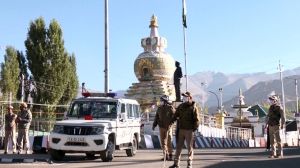PGI cardiac centre makes medical history with robotic surgery
The patient was 47 years old with coronary artery disease and 90% stenosis (abnormal narrowing) of major coronary arteries.
 The Department of Otolaryngology has begun the auditory brainstem implant pro-gramme, with the first child operated on August 29. (File)
The Department of Otolaryngology has begun the auditory brainstem implant pro-gramme, with the first child operated on August 29. (File)THE FIRST-EVER case of robotically assisted bioresorbable stent implantation in the world was done by the Department of Cardiology, Advanced Cardiac Centre, PGI, as an interventional procedure. The case was performed by Prof Yash Paul Sharma, head of the Department of Cardiology and team.
The patient was 47 years old with coronary artery disease and 90% stenosis (abnormal narrowing) of major coronary arteries. The patient underwent successful implanta- tion of bioresorbable stents through the Corindus Robotic Arm of Cardiac Cath Lab.
A bioresorbable stent is made of a dissolving polymer, similar to dissolving sutures, allowing the artery to pulse and flex naturally. Advanced Cardiac Centre, Department of Cardiology at PGI is the first centre in India where robotic- assisted percutaneous coronary interventions (PCIs) have been done. The ear- lier trial and training phase of robotic PCI has been done and the inauguration is expected soon.
Robotic PCI has the advan- tage of a high degree of preci- sion and cuts down radiation exposure. Newer bioresorbable stent with thinner struts (100 microns) developed in India have been introduced, now these stents dissolve in body over two-three years leaving the natural artery intact. The older generation BRS had strut thickness of 150 microns. The clinical registry of patients with newer generation BRS and also robotic PCI is being carried out in PGI.
As a landmark, the centre has achieved least mortality (6.8%) in patients with acute coronary syndrome, including cardiogenic shock and comor- bidities of all age groups.
In a first, the institute carries out auditory brainstem implant
The Department of Otolaryngology has begun the auditory brainstem implant pro- gramme, with the first child operated on August 29. This implant helps a deaf person regain hearing by surgically implanting an electronic device.
This implant provides the gift of sound to those patients who cannot benefit from cochlear implant due to some damage to their auditory nerves. This was the first-ever auditory brainstem implant in the region. Talking about the complex surgery, Dr Naresh Panda, Head of the Department of Otolaryngology, PGI said, “The department has been running a successful cochlear implant programme for the past 19 years. However, the auditory brainstem implantation is indicated in those patients in whom the cochlea and the cochlear nerve are either absent or not functioning well. The auditory brain- stem implant bypasses the cochlea and the cochlear nerve, and is placed in the brainstem.”
This complex surgery was performed by a team of experts comprising Dr Naresh Panda (ENT), Dr Pravin Salunke (Neurosurgery), Dr Sanjay Munjal, Dr Parul Sud (Audiology) and Dr Nidhi Panda and Dr Babita Ghai (Anesthesia) from PGI, under the supervision of Prof Mohan Kameshwaram, Prof M C Vasudevan, and Prof Ranjith Rajeswaran from Chennai.
Dr Kameshwaram and Dr Vasudevan have extensive experience in performing auditory brainstem implant surgeries in the country.







